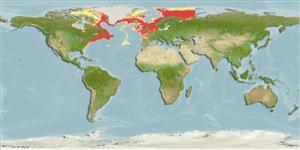Common names from other countries
分類 / Names
共通名の | 類義語 | Catalog of Fishes(部類, 種) | ITIS | CoL | WoRMS | Cloffa
板鰓亜鋼(サメとエイ類) (sharks and rays) >
Rajiformes (Skates and rays) >
Rajidae (Skates)
Etymology: Amblyraja: Greek, amblys = darkness + Latin, raja, -ae = ray (Raja sp.) (Ref. 45335).
Environment: milieu / climate zone / depth range / distribution range
生態学
海; 汽水性の 底生の; 海洋回遊性 (Ref. 51243); 深さの範囲 5 - 1540 m (Ref. 117245), usually 25 - 440 m (Ref. 114953). Boreal; -1°C - 14°C (Ref. 49751); 79°N - 38°N, 95°W - 54°E (Ref. 55275)
North Atlantic and adjacent Arctic.
Length at first maturity / サイズ / 重さ / 年齢
Maturity: Lm 87.5 range ? - ? cm
Max length : 105 cm TL オス/雌雄の選別がない; (Ref. 53748); 最大公表体重: 11.4 kg (Ref. 53748); 最大記録サイズ: 28 年 (Ref. 88929)
簡単な記述
検索表 | 形態学 | 形態計測学
背面の脊椎 (合計) : 0; 肛門の骨: 0. Adults are rhomboid in shape, young are rounder (Ref. 7251). Short, stiff, bluntly triangular snout; tail shorter than body (Ref. 5578). Upper surface very rough, with solid thornlets scattered all over disc and tail, underside smooth, except for some prickles on snout; a constant pattern of separate orbital thorns, a regular row of 13-17 large thorns from nape to first dorsal fin (Ref. 3167); large, close-set thorns with star-shaped bases at upper disc (Ref. 5578). Coloration highly variable; brownish grey with scattered irregular black blotches dorsally; white ventrally; with darker spots and blotches on tail and pelvic fins; black spot on tip of tail (Ref. 2708).
Eurybathic, eurythermic (Ref. 4426) and benthic (Ref. 58426). Cold temperate species found in offshore waters (Ref. 88171) on all kinds of bottoms (Ref. 3167), mainly sandy and muddy (Ref. 82311). In the northeast Atlantic most common between 50-100 m depth (Ref. 88187) at temperatures of 2-5 °C (Ref. 89120). Some seasonal migrations have been reported from the western Atlantic (Ref. 52109, 89121). Migration experiments showed that 85 % of tagged individuals remained within 93 km of the release site, with longest distance travelled at 180 km (Ref. 82319). Feed mainly on fish, crustaceans (Ref. 5951) and polychaete worms (Ref. 5578), but also on hydroids, molluscs, cephalopods and echinoderms (Ref. 49751); known to be a scavenger (Ref. 89122). Diet changes with increasing body size (Ref. 82311). Different populations of starry rays mature at different ages and sizes (Ref. 88171). Oviparous (Ref. 3167). Maturity size varies from 44-90 cm TL. Young hatch at ca. 8-12 cm TL (Ref. 114953). Young may tend to follow large objects, such as their mother (Ref. 205). Rarely reaches 60 cm in the North Sea (Ref. 88187). Able to detect weak electric fields generated by potential prey organisms and may also generate its own weak electric fields (Ref. 10311). Probably taken by hake trawlers (Ref. 5578). Few are dried and salted in Iceland (Ref. 6902). It is a common Skate whose landings are converted to fish-meal (Ref. 117245). It has been mentioned that North American specimens grow to a larger size than East-Atlantic specimens (Arve Lynghammar, pers.comm., 11/09).
Distinct pairing with embrace. Oviparous, laying 10-45 egg cases each year (Ref. 44869, 41305). Eggs are oblong capsules with stiff pointed horns at the corners deposited in sandy or muddy flats (Ref. 205). Egg capsules are 3.4-8.9 cm long and 2.3-6.8 cm wide (Ref. 41250). Paired eggs are laid. Embryos feed solely on yolk (Ref. 50449). In the North Sea, fully formed individuals hatch after 4 months and pups are about 8-11 cm in length (Ref. 44869, 37969). In the Barents Sea, low water temperature may lengthen embryonic development time to 2.5-3 years (Ref. 44869).
McEachran, J.D. and K.A. Dunn, 1998. Phylogenetic analysis of skates, a morphologically conservative clade of elasmobranchs (Chondrichthyes: Rajidae). Copeia 1998(2):271-290. (Ref. 27314)
CITES (Ref. 128078)
Not Evaluated
Human uses
水産業: 少数商業の; ゲームフィッシュ: はい
用具
特記事項
XMLをダウンロードして下さい
インターネットの情報源
Estimates based on models
Preferred temperature (Ref.
115969): -0.8 - 5, mean 1 (based on 340 cells).
Phylogenetic diversity index (Ref.
82804): PD
50 = 0.5010 [Uniqueness, from 0.5 = low to 2.0 = high].
Bayesian length-weight: a=0.00316 (0.00272 - 0.00368), b=3.25 (3.21 - 3.29), in cm Total Length, based on LWR estimates for this species (Ref.
93245).
栄養段階 (Ref.
69278): 4.2 ±0.3 se; based on diet studies.
回復力 (Ref.
120179): 低い, 4.5年~14年の倍増期間の最小個体群 (K=0.17; tm=4; Fec=13-20).
Prior r = 0.09, 95% CL = 0.06 - 0.13, Based on 1 full stock assessment.
Fishing Vulnerability (Ref.
59153): Moderate to high vulnerability (51 of 100).
